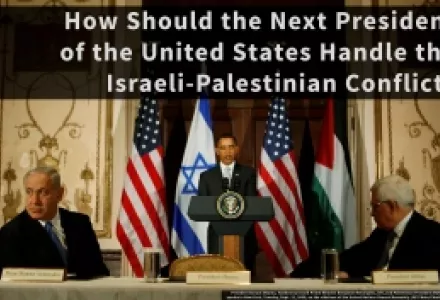MEI Senior Fellow Study Group: Session 1: How did we get here?
First session of Middle East Initiative Senior Fellow Robert M. Danin's study group "How Should the Next President of the United States Handle the Israeli-Palestinian Conflict?"
First session of Middle East Initiative Senior Fellow Robert M. Danin's study group "How Should the Next President of the United States Handle the Israeli-Palestinian Conflict?"

First session of Middle East Initiative Senior Fellow Robert M. Danin's study group "How Should the Next President of the United States Handle the Israeli-Palestinian Conflict?"
This session places U.S. policy approaches towards the Israeli-Palestinian conflict in a wider historical and analytical framework. First outlining the contours of US policy towards the Palestine conflict from 1947 on, then shifting focus to the efforts of the Obama Administration to pursue Israeli-Palestinian peace. Why has the United States deemed it important to lead Israeli-Palestinian peace-making efforts? Why has this conflict mattered to the United States? What have been the continuities and discontinuities in U.S. approaches to the conflict? What have been the successes, if any, and what have been the failures? Why have United States efforts been more effective than at other times—is it U.S. policy, regional conditions, the role of personalities?
Readings: Click to Download Reading List
Please note: this event is part of a three-session study group open by application only. Applications are no longer being accepted to this group. No additional participants will be accepted.